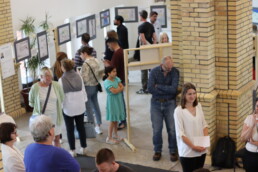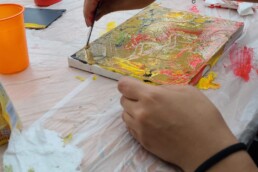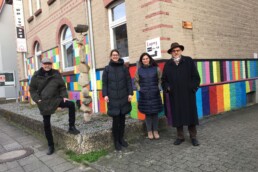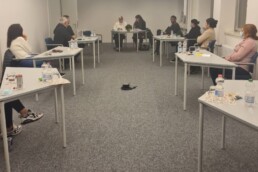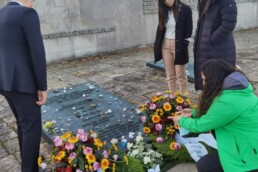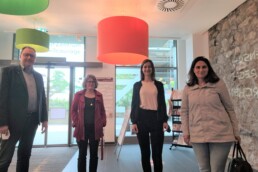About the Network
The aim and intention are that dialogue should arise between as many actors as possible from different institutions, parties, religious communities, associations and groups connected to the topic of ‘Remembrance of Genocide’. The Network of Remembrance Culture was founded to approach this question. In doing so, we focus primarily on the genocide of the Yazidis. Likewise, the Holocaust and (other) genocides should be remembered. We want to inform, educate and raise awareness.
The Network of Remembrance Culture is a mailing list composed of all working directly or indirectly on the genocide of the Yazidis or connected to survivors. Anyone interested is also welcome to join the list. The network provides information about upcoming events, projects or campaigns and invites you to become active.
Members
Ali Atalan Social scientist, former representative in the Turkish Parliament for HDP (Peoples’ Democratic Party)
Katrin Unger Deputy Director of the Bergen-Belsen Memorial and director of the Education and Encounters department
The Bergen-Belsen Memorial sees itself as an international place of remembrance and learning. It places the history of the POW Camp (1940-1945) and the Concentration Camp (1943-1945) as well as the Displaced Persons Camp (1945-1950) and their impact in a global context. It is important for us to perceive the heterogeneity of the visitors. That means, among other things, to recognize, that the history of the place is conceived before a variety of experiences of violence and disenfranchisement.
Mariusz Rybak Bergen-Belsen Memorial, specialist coordination office of the ‘Partnership for Democracy in Bergen’
Katja Seybold Historian at Bergen-Belsen Memorial, Reserach Department
www.bergen-belsen.stiftung-ng.de/en/research-and-documentation/
Gesellschaft für bedrohte Völker (Society for Threatened Nations)
The Society for Society for Threatened Nations (GfbV) is an international human rights organisation working to raise awareness about persecuted and threatened ethnic and religious minorities, nationalities and indigenous communities.
Dr. Khabat Kedir Eziden Weltweit e.V. (Yazidis Worldwide)
Yazidis Worldwide is an international, non-profit aid organisation that works on behalf of Yazidis and Christian minorities. Our main areas of work are the advancement of women and education, rehabilitation after the genocide and humanitarian aid.
Gohdar Alkaidy Stelle für Jesidische Angelegenheiten e.V. (Vocal Point for Yazidi Affairs)
The Vocal Point for Yazidi Affairs is a religious, cultural, social and non-partisan association committed to the preservation and adaptation of Yazidi religion and culture to modern world progress and the coexistence of peoples, cultures and religions as promoted by Yazidi teachings and the German democratic constitution.
Hilke Langhammer Bomann-Museum Celle
In the heart of the city, directly opposite Celle Castle, is the Bomann Museum, one of the largest and most beautiful regional museums in northern Germany. Since 1907, the museum has housed its nationally important collections of folklore in eastern Lower Saxony and the history of the city of Celle on around 3,500 square meters. Today, seven exhibitions await visitors that vividly present the city’s cultural history and region.
Andreas Döring Schlosstheater Celle (Castle Theatre Celle)
As a place of history, the Schlosstheater Celle contributes to the culture of remembrance, especially since the origin of its current form is rooted in the reconstruction of civil society. More than 100 colleagues support the artistic work of the 16-strong ensemble, which offers a comprehensive program with over 20 premieres a year at four venues.
As one of the six municipal theatres in Lower Saxony, the Schlosstheater Celle explores the tension between tradition and modernity – and between town and country.
Murat Yavsan Gemeinde der Eziden e.V. (Community of the Yazidis in Bergen)
The non-profit association in Bergen has set themselves the task of forming a community of Yazidis living here, in which religion and culture are cultivated and communicated to interested parties.
Promoting religion, language, and cultural backgrounds is essential to our association. In addition, we are committed to promoting integration in Germany.
Sabine Maehnert Gesellschaft für christlich-jüdische Zusammenarbeit in Celle e.V. (Society for Christian-Jewish Cooperation Celle)
The Society for Christian-Jewish Cooperation Celle was founded in 1980. Like other Jewish organisations in Germany, it is aware of the guilt and accepts responsibility for the destruction of Jewish life carried out in Germany’s name. The Society is committed to realising all people’s rights to life and freedom, regardless of belief, origin or gender. The Celle society, together with the Jewish community of Celle and the city of Celle, creates a program that provides information about Judaism as a religion, Jewish history, literature, music and the state of Israel.
Ronya Othmann Writer and Journalist
She has received many awards, including the residency at the Lukas Artists’ House in 2015, the MDR Literature Prize in 2015, the Audience Prize at the Ingeborg Bachmann Competition in 2019 for her text ‘Seventy-Four’ about the genocide of the Yazidis, and the Gertrud Kolmar Promotional Prize for her poem ‘I have seen’.
Martina Staats Head of the memorial in the JVA Wolfenbüttel
The memorial in the JVA Wolfenbüttel deals with the history of the National Socialist judiciary, the penal system as well as the individual experiences of persecution of the imprisoned and executed.
https://wolfenbuettel.stiftung-ng.de/en/
Dr. Gabriele Frech Amnesty International, Celle Group
Amnesty International is an independent international human rights organisation whose campaigns and actions are based on the principles of the United Nations Universal Declaration of Human Rights. The Celle Group addresses the global human rights situation and campaigns against torture and the death penalty, as well as for the release of political prisoners.
Claudia Dettmar-Müller Mayor of Bergen
Yilmaz Kaba Yazidi Activist, Journalist
Enno Stünkel Volkshochschule (VHS) Celle (Adult Education Centre Celle)
The VHS Celle is the largest extracurricular educational institution in the city and district of Celle and understand adult education as a contribution to a democratic society.
Kirsten Lühmann Freundschaftsverein Celle-Batman e.V. (Celle-Batman Friendship Association) and Europe Union Celle
The friendship association was founded to accompany the town twinning between Celle and Batman in south-east Turkey. However, this partnership has been prohibited by the Turkish Ministry of Interior. The association hope that this attitude will change and that the people of the two cities can become friends through the partnership.
The Europe Union is a non-partisan citizens’ initiative that works to strengthen the European Union, international understanding and peace.
BÜNDNIS NIEDERSACHSEN PACKT AN (Alliance Lower Saxony tackles action)
BÜNDNIS NIEDERSACHSEN PACKT AN is a non-partisan alliance of politics and civil society with all relevant actors – also at the regional level – for the integration of refugees. The alliance is open and lively and stands for a democratic, pluralistic, cosmopolitan and tolerant Lower Saxony. It serves as a work and dialogue platform to share the existing knowledge, join forces and combine the integration offers of the municipal, state and independent providers in a coordinated manner.
ZeitZentrum Zivilcourage
The ZeitZentrum Zivilcourage is an extracurricular place of learning in the state capital Hanover using biographies to convey the history of Hanover’s urban society under National Socialism. Under the motto ‘Join in or resist’, visitors are encouraged to critically examine the options for action and decision-making that people have had in the past and to reflect on democratic coexistence in the present and future.
Dr. Menno Preuschaft & Carolin Scholz Landesdemokratiezentrum/ L-DZ Niedersachen (State Democracy Centre Lower Saxony)
The L-DZ Niedersachsen in the State Prevention Council at the Lower Saxony Ministry of Justice promotes counselling for those affected by right-wing, racist or anti-Semitic violence. The centre offers mobile counselling and assists civilians exiting right-wing or anti-Semitic circles. It also runs a network of specialist centres on preventing religiously-based radicalisation. In addition, measures for the prevention of anti-Semitism, anti-discrimination counselling and small projects are implemented.
„Eby“ Bakari Tangara Afrikanischer Dachverband-Nord e.V. (ADV-Nord, African Chapter for Northern Germany)
The ADV-Nord has existed since 2007, advocating for a democratic coexistence in northern Germany, primarily working against discrimination and especially racism. They see themselves as bridge builders between people with African origins and all other cultural communities. The ADV-Nord is currently made up of 25 associations and many committed individuals who work together for the well-being of fellow African citizens. We support them in implementing their projects or assisting in crises.
Dr. Anne Bonfert Heinrich Böll-Stiftung Niedersachen (Foundation Life & Environment Lower Saxony)
The Life & Environment Foundation is committed to a diverse, democratic-emancipatory, ecologically and socially just society. As a (politically) green Lower Saxony educational institution, they are clearly positioned, offer orientation and simultaneously open up space for negotiation processes. They are currently working on three main areas: climate, social justice and democracy.
Moritz Thies CVJM LVH e.V. / Anne-Frank-House Oldau
The CVJM LVH and the associated youth education centre ‘Anne-Frank-House Oldau’ have been working for well over 20 years in the context of historical-political youth education on the subject of remembrance culture and in particular on the Bergen-Belsen concentration camps, National Socialism and the biography of Anne Frank. Dealing with the past persecution under National Socialism should encourage people to take action against current discrimination.
Enno Stünkel Celler Netzwerk gegen Antisemitismus (Celle network against anti-Semitism)
The Celle Network Against Antisemitism is an association of Jewish and non-Jewish actors conducting education and awareness-raising against antisemitism since 2015, which includes reflection on remembrance and remembrance politics in post-Nazi society.
Statements: Why does the Network of Remembrance Culture matter?
A culture of remembrance means preserving the positive from the past, letting live what is worth preserving, and not forgetting the bad so that it never happens again.
Ali Atalan
A living culture of remembrance is important to educate, prevent trivialisation and denial and, last but not least, prevent the genocides of tomorrow. Moreover, exchange and networking are essential for a lively culture of remembrance.
Ronya Othmann
Dealing with the past shows us clearly that there can be no law without a constitutional state and how important it remains to stand up for democratic values, tolerance and respect. It is also important to develop a global perspective on systems of injustice and genocide. Remembering is future!
Martina Staats, head of the memorial in the JVA Wolfenbüttel
We are part of the network of remembrance culture because contemporary and comparative aspects are of particular importance for our educational work, especially from the perspective of remembrance culture. Which aspects are of particular importance when dealing with the Holocaust and the genocide of the Yazidis? What are the differences in the culture of remembrance, and what are their reasons for these differences? From a comparative perspective, can general conclusions be drawn for dealing with the consequences of genocide? What are the limits of comparative approaches? We expect exciting impulses from the network to answer these and other questions. At the same time, we want to support Project FERMAN in promoting the causes, course and consequences of the genocide of the Yazidis in Germany, thereby increasing the chances of those affected receiving support.
Jens Binner, ZeitZentrum Zivilcourage
We have become part of the network of remembrance culture because it is important to work through history together through dialogue. It is important to include many different perspectives. It is the only way to learn from history and shape the future together.
Society for Threatened Nations
Amnesty International has set itself the task of observing human rights violations, such as the genocide of the Yazidis and making them public. The Celle group is part of the Network of Remembrance Culture to support project work, pass on information about the genocide, and participate in campaigns and events.
Dr Gabriele Frech, Amnesty International Group Celle
Above all, we are interested in getting new impulses for our work and that of our cooperation partners through networking with other actors. We would also like to sensitise ourselves regarding the culture of remembrance.
Dr Menno Preuschaft & Carolin Scholz, Lower Saxony State Center for Democracy
We are part of the project because an awake and ongoing culture of remembrance can help to process the events of 2014 and draw public attention to them.
Dr Khabat Kedir, Yazidis Worldwide
Our city is linked in a special way to the atrocities of National Socialism through the Bergen-Belsen concentration camp. Based on this responsibility, we have given ourselves the motto ‘City of Peace and Internationality’. These are two big words for a small town, but we actively value living this motto. The culture of remembrance is an important aspect of this.
Claudia Dettmar-Müller, Mayor of Bergen
‘In order to shape your future, you must know your past,’ says an African proverb. We want to become part of the network of remembrance culture because we are convinced that remembrance, transparent processing, and an honest confrontation with past atrocities are essential as a warning in the collective memory to recognise and ban historical errors and the resulting misconduct.
‘Eby’ Bakari Tangara, African Chapter for Northern Germany
We want to be part of this network because memories and events are fragments that only form a complete puzzle as a whole. However, this puzzle can and must be interpreted and viewed on different levels. The memory must be linked to a topicality so that a connection to the message of the Enlightenment can be created and admonishing relics, exhibits, and exhibitions do not degenerate into empty vessels. The vocal Point for Yazidi Affairs can contribute a lot to this.
Gohdar Alkaidy, Vocal Point for Yazidi Affairs
I am happy to be part of the network of remembrance culture because I think it is right and important for people to remember in this way and, above all, to remember constructively and critically. Coming to terms with and remembering is an important way of avoiding new acts of inhumanity, war crimes, crimes against humanity and genocide. Dealing with crimes and genocides and remembering them should become an integral part of our society. I wish to contribute [towards these efforts].
Yilmaz Kaba
We want to be part of Project FERMAN because we are concerned with the question of how our culture of remembrance can change as society diversifies. The aim of remembrance policy work should be respectful interaction with one another in the knowledge of historical experiences and independent of individual backgrounds. We have dealt with the genocide of the Yazidis several times in different cooperations. In 2022, together with JANUN and probably Hometown e.V., we are planning an event on the situation of Yazidi refugees in Turkey.
Dr Anne Bonfert, Foundation Life & Environment Lower Saxony
We consider networking with other institutions very important since historical-political educational work has a high social status, especially in such challenging times, and is still opposed by certain groups. With a good network, we can develop effective concepts together.
Moritz Thies, Youth Education Centre Anne-Frank-House, CVJM National Association Hanover
The section ‘Not from here?’ uses three significant examples for Celle to show migration to the region and experiences with losing one’s homeland and settling abroad and is also dedicated to the history of Yazidis in Celle, among other things. The topic needs to be continued and supplemented, which is why the museum is interested in networking with other actors.
Hilke Langhammer, Bomann-Museum Celle
Our motivation for participating in the Network of Remembrance Culture lies in the fact that we, as an educational institution, want to be part of the culture of remembrance in a learning and mediating manner.
Enno Stünkel, VHS Celle
We are convinced that culture is a social expression of togetherness and learning. As a theatre, we offer local people and people from far away a home – also through the change in perspective of the art and the stories.
Andreas Döring, Schlosstheater Celle
A culture of remembrance is important – we know that here in Germany from our experience. Remembering is about not forgetting the people who were wronged, who lost their homes, their health and often their lives. When we forget the suffering of those affected, when we forget those affected, we kill them a second time. The culture of remembrance is not about guilt but about documenting what was. It is also about being able to prevent such crimes in the future.
Kirsten Lühmann, Celle-Batman Friendship Association and Europe Union Celle
The memory of the Holocaust is an important part of the work of the Society for Christian-Jewish Cooperation in Celle. Remembering and dealing with this topic should help ensure that something like this will never be possible again in our country.
Sabine Maehnert, Society for Christian-Jewish Cooperation Celle
The topic of remembrance culture is very important to us. We act as a mouthpiece for people affected by the 2014 genocide and would like to continue to do so in the future. Among other things, a memorial stone (memorial) and a commemorative plaque will be created in the cemetery of Bergen. We are supporting this project in cooperation with the city of Bergen and other local associations.
Murat Yavsan, Community of the Yazidis
The alliance NIEDERSACHSEN PACKT AN joins the ‘Network of Remembrance Culture’ because a continuous and critical examination of genocide and persecution and today’s lessons learned are indispensable for a cohesive society. We need empathy for the persecuted and displaced as well as a vigilant attitude so that such inhuman atrocities can not happen again.
Alliance ‘Niedersachsen packt an’
Activities
Exhibition in Bergen, 'The Horrors of Sinjar'
9 December 2022 – 15 January 2023
Location: St. Lamberti Gemeinde
Cooperation Partners: City of Bergen, Association of Yazidis in Bergen, St. Lamberti Gemeinde, Sinti, Travellers and Roma Celle Allertal
Collecting tales against Forgetting
Summer 2022 – Summer 2023
Intercultural Library, City library Celle
Yazidi Culture Centre in Celle and Greater Celle e.V.
Educational Art workshop with young protagonists
Summer 2022
Atelier 22, Deniz Karabulut (Project X) KulturTrif(f)t
Exhibition in the Celle City Hall, 'The Horrors of Sinjar'
1-21 August 2022
Patron: Susanne McDowell, Head of the Department of Social Affairs, Celle
Cooperation partners: Yazidi Culture Centre Celle and Greater Celle, Atelier 22, KulturTrif(f)t, Evangelical-Lutheran Church Celle, AWO country chapter Celle, Multigenerational House Celle
Trailer to Remembering the Ferman 3 August
July/ August 2022
Impressions from the Network
Contact and Becoming a Member
Dr Leyla Ferman/ Isabell Leverenz
E: projekt.ferman@stiftung-ng.de
+49 (0) 51 41 – 933 55 52

